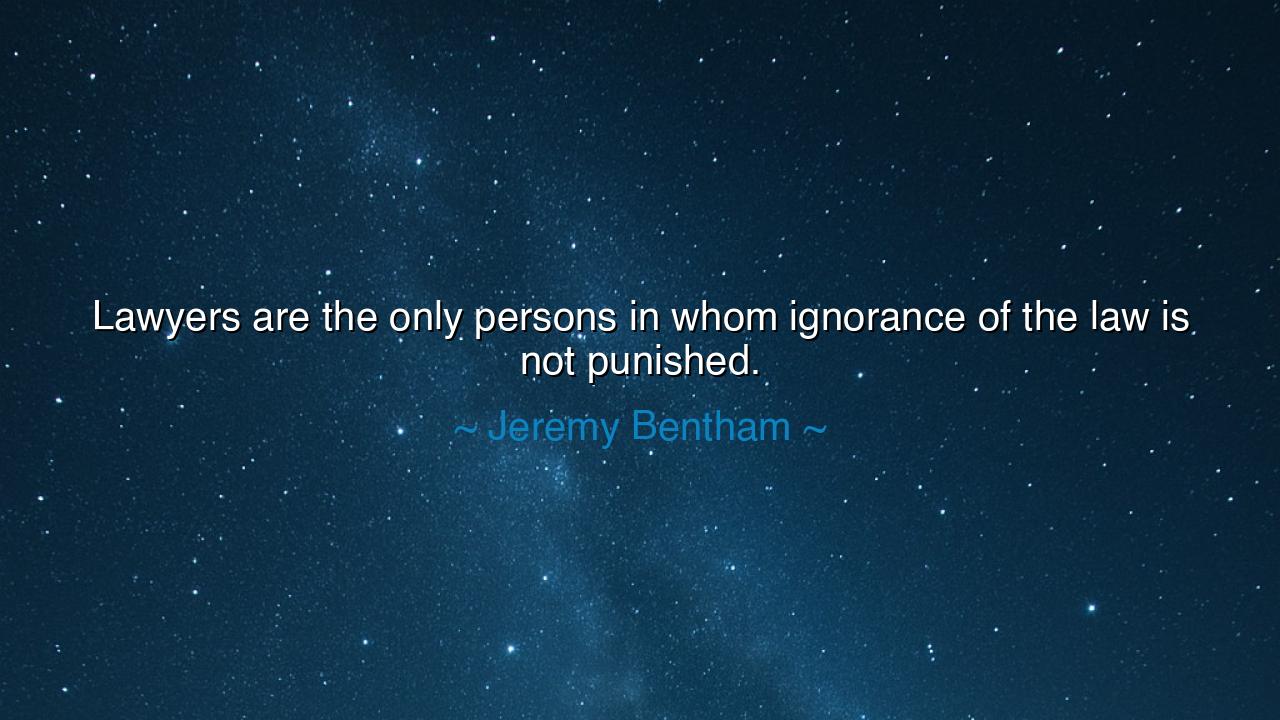
Lawyers are the only persons in whom ignorance of the law is not






Hear the biting words of Jeremy Bentham, philosopher of law and reformer of society: “Lawyers are the only persons in whom ignorance of the law is not punished.” Though clothed in wit, the saying is sharpened with truth. For Bentham, who sought to strip away the fog of legal jargon and make law plain to the people, saw clearly the hypocrisy of a system where the common man suffers for his lack of knowledge, yet those entrusted to guide him may err without consequence. His words carry both rebuke and warning, exposing a flaw in the order of justice.
The meaning of this saying lies in the ancient maxim that ignorance of the law excuses no man. The thief cannot say he did not know stealing was forbidden; the corrupt official cannot plead ignorance of statutes. But Bentham points to the irony: those whose very calling is to know and interpret the law—the lawyers—often twist it, misapply it, or err in their duties without suffering the penalties their clients must endure. Thus, the burden falls always upon the weak, while the guardians of justice are shielded by their robes of profession.
History has offered many mirrors to this truth. In the courts of medieval Europe, peasants who could not read were condemned by laws written in Latin, a tongue they could not understand. They bore the full weight of punishment, while their advocates and judges, though sometimes careless or corrupt, escaped unscathed. The people suffered for their ignorance, while the lawyers, who profited from their plight, were untouched. This is the injustice that stirred Bentham’s pen, for he believed law should be simple, transparent, and accessible to all—not a labyrinth in which only the initiated could find their way.
Consider too the trials of the French Revolution. When the old order fell, one cry of the people was against the manipulation of law by lawyers and officials, who grew rich from the disputes of others while ordinary men were ground to dust beneath the wheels of justice. The Revolution sought, however imperfectly, to sweep away this hypocrisy, declaring that the law must be the same for all—clear, universal, and binding upon lawyer and layman alike. Bentham’s words resonate with this spirit: that the privilege of lawyers cannot be allowed to mask ignorance, lest justice itself become a mockery.
The deeper wisdom of Bentham’s saying is this: power breeds exemption unless it is held accountable. Those who know the law, or claim to know it, must be held to higher standards, not lower. For if the shepherd may wander blindly while the flock is punished for straying, then the order of things is inverted, and ruin is sure to follow. True justice demands that the learned be doubly bound, that their ignorance or corruption be punished more severely, for upon them rests the guidance of others.
The lesson for us is clear: demand clarity, accountability, and fairness in the systems of law that govern our lives. Do not allow those entrusted with power to escape the standards they impose upon others. If you are guided by lawyers or leaders, question them with vigilance. If you yourself carry knowledge, bear it with humility, for ignorance in the powerful harms not only the self but countless others. Let law be light, not darkness, and let it shine equally upon all.
Therefore, take practical action: support reforms that make the law plain to the people; honor those lawyers who serve with integrity, but hold accountable those who hide behind their titles. In your own dealings, seek knowledge of the rules that govern you, so that you are not at the mercy of others’ ignorance. Teach your children not only to obey the law but to understand it, for knowledge is the shield against injustice.
So remember Bentham’s sharp wisdom: “Lawyers are the only persons in whom ignorance of the law is not punished.” Let it remind you that justice is not a game of words, but the safeguard of life and liberty. Hold high the standard of accountability, and let none—whether citizen or counselor—stand above it. For only when all are bound equally by the law will the people walk in the light of true justice.






AAdministratorAdministrator
Welcome, honored guests. Please leave a comment, we will respond soon